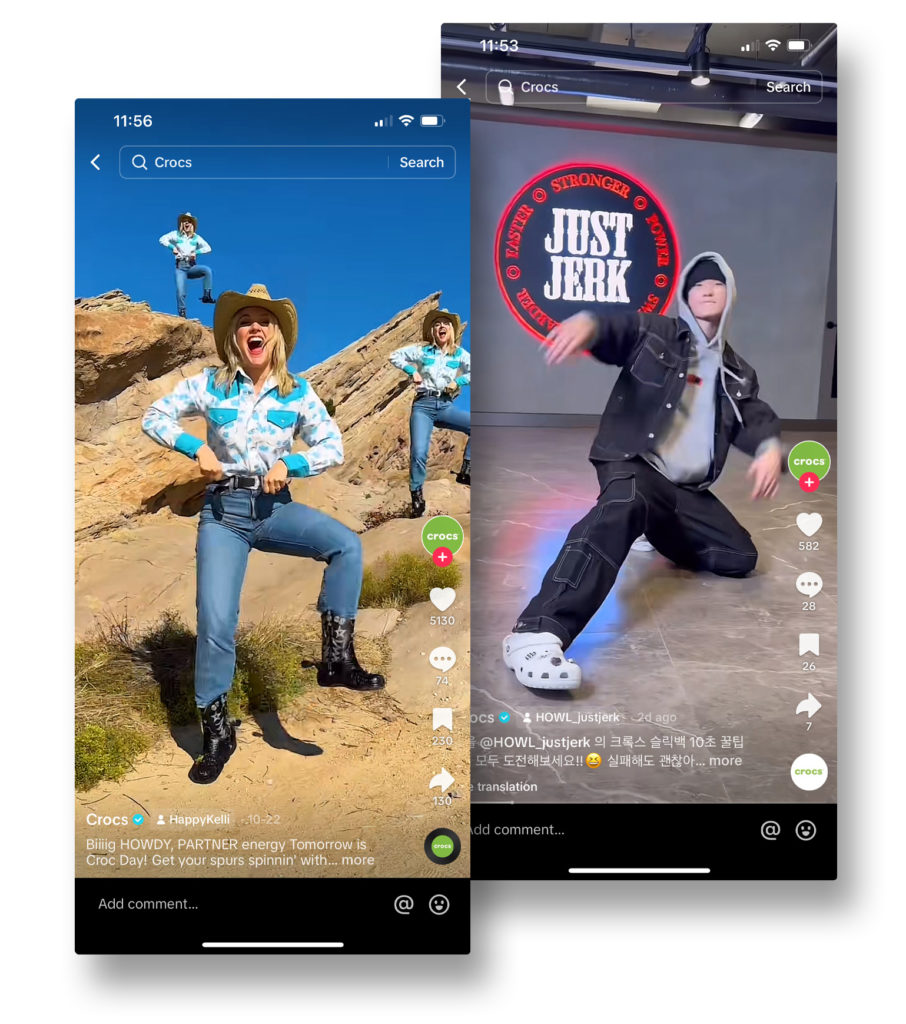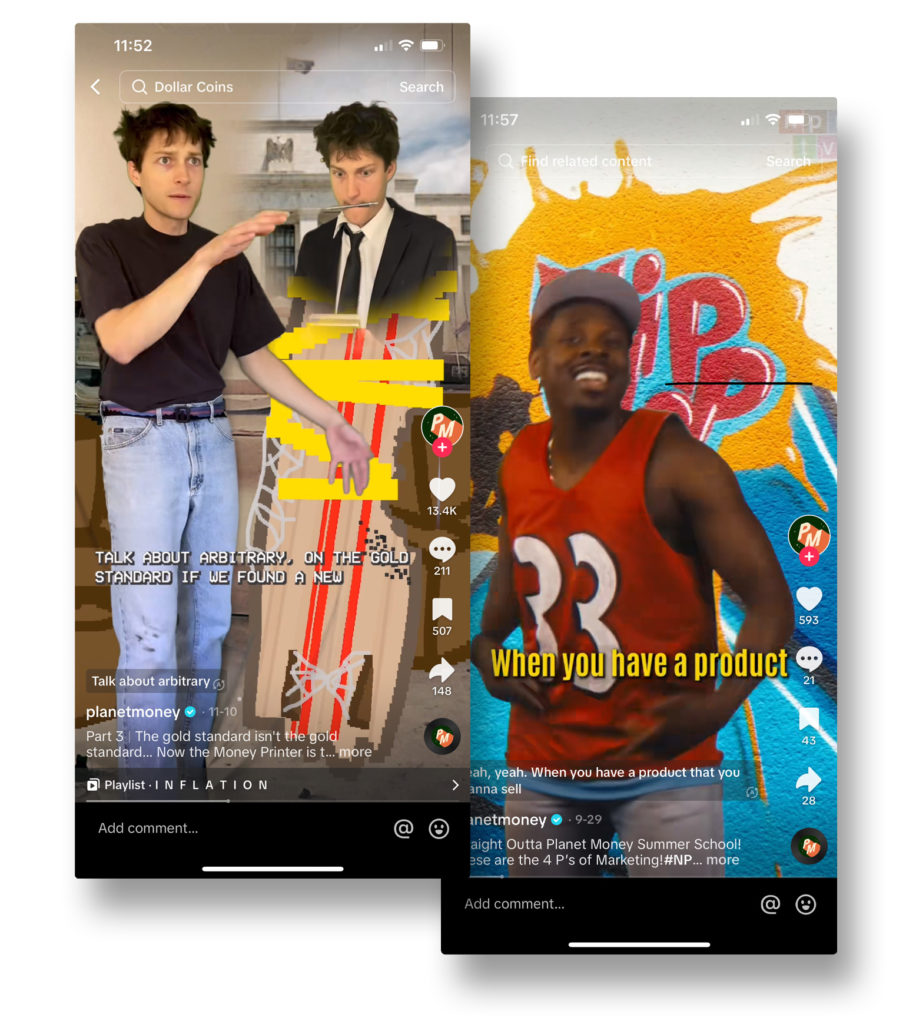In an era dominated by platforms like TikTok, Instagram Reels, and YouTube Shorts, brands are faced with the challenge of capturing audience attention in a matter of seconds. The key to success in this fast-paced digital landscape? Edutainment – a blend of education and entertainment. In this blog, we’ll explore how edutainment not only helps brands stay relevant but also builds stronger relationships with their audience, showcasing a more approachable and human side.
The Rise of Short-Form Content
The surge of TikTok, Reels, and YouTube Shorts has reshaped digital marketing, demanding brands to create content that entertains and provides value in seconds. This shift has given rise to edutainment, where brands combine entertainment with educational content for a lasting impact. Real case studies and data highlight the success stories of brands that have embraced this trend:
B2C Case Study: Crocs Rocks
Crocs has fully embraced the short-form content wave on TikTok and Reels, producing captivating and lively videos that are not only enjoyable but also highly shareable. Their dynamic approach, featuring vibrant visuals set to trending music and collaborations with influential figures, has allowed them to carve out a distinctive niche. This strategic effort has catapulted Crocs to a significant presence, boasting 2.1 million followers on TikTok and a comparable following on Instagram Reels.

B2B Case Study: PlanetMoney Explains
Navigating the serious and intricate realm of NPR, the Planet Money team has ingeniously injected humor into their content, demonstrating that even the most solemn economic matters can be made engaging. Tackling complex socioeconomic concepts, they have created high-impact edutainment content that seamlessly combines humor and education. This case study serves as a testament to the notion that even weighty subjects can be made entertaining through adept writing and impeccable timing.

If you need assistance forming a viable strategy for robust short-form content creation, leverage one of our collaborating branding and marketing experts. Schedule a free consultation today and find out how they can help you create edutainment content that can resonate with your specific target audience.
Building Stronger Connections through Edutainment
Consumer sentiment has undergone a notable transformation, granting customers the power to selectively engage with and make purchasing decisions from brands. The influence of buying choices has shifted towards fellow consumers on short-form content platforms, essentially transferring the reins of marketing from brands to the hands of the consumer. The prevalence of mobile devices, supplanting traditional media like TV and radio, has altered how people consume media, with movies, news, and information now primarily sourced from short-form content tailored for mobile platforms. This paradigm shift has left many marketing professionals and brands grappling with how to navigate this evolution in consumer behavior. In this exploration, we delve into fundamental strategies that brands must adopt to successfully capture the attention necessary to market to their target audience in ways aligned with their preferred modes of content interaction.
Humanizing the Brand
Crafting content that seamlessly integrates humor with valuable information enables brands to present a more human and relatable facade, dismantling corporate stiffness and cultivating a profound sense of connection. This humanization process renders the brand approachable and friendly, marking a departure from an era where relying solely on value sufficed to persuade the target audience that the brand is the answer to their challenges. Contemporary customers, whether in the B2B or B2C sphere, seek both entertainment and value from brands. Contrary to the belief that injecting humor into marketing might tarnish a brand’s image, this notion has been debunked by some of the most entertaining and engaging short-form content, particularly in fields as serious as science or medicine. These creators have demonstrated that even the most solemn brands can successfully leverage levity without compromising their brand integrity.
Demonstrating Authenticity
Brands that wholeheartedly adopt edutainment are signaling a commitment to connecting with their audience on a personal level, fostering an authentic brand image. This transparency resonates with viewers, laying the foundation for trust in the brand.
The era of short-form content platforms has cultivated a more discerning consumer base. These consumers, armed with the ability to assess a brand’s authenticity, actively engage with fellow creators and individuals on social platforms. Consequently, brands must be cautious not to produce content solely for the sake of riding a trend and superficially catering to their audience’s preferences. Such inauthentic attempts risk exposure, as consumers possess the acumen to discern genuine engagement from opportunistic trend-chasing.
If a brand’s content lacks authenticity and is perceived as insincere, consumers are quick to unveil these efforts, disseminating their findings within their own community. This not only jeopardizes customer loyalty but may prompt consumers to actively create content that casts the brand in a negative light. Therefore, brands venturing into the realm of edutainment must prioritize authenticity, ensuring that their content emerges from a genuine commitment rather than a superficial alignment with fleeting trends.
Softening the Brand Image
Edutainment provides a platform for brands to shift away from the often serious image associated with traditional advertising, revealing a softer and more approachable facet. This strategy proves particularly potent in industries characterized by a perception of seriousness or technicality.
Despite this, a common obstacle faced by corporations’ C-Suites is the apprehension that injecting humor into marketing efforts might compromise the brand’s credibility. This concern, however, is misplaced. Softening a brand’s image through humor doesn’t entail transforming it into a parody; instead, it involves embracing entertainment in the form of storytelling that connects on an emotional level.
The resistance from brands to pivot and adopt edutainment often stems from a lack of understanding of how it can be seamlessly integrated while maintaining core values and mission without appearing superficial or corny.
To achieve a sophisticated storytelling approach that incorporates levity and resonates with the target audience, brands should enlist the expertise of branding and marketing professionals. These experts can craft content and messaging that not only upholds the brand’s value proposition but also narrates a genuine story without taking itself too seriously. This delicate balance ensures that humor enhances rather than diminishes the brand’s credibility, fostering a connection with the audience while staying true to its essence.
Relatability through Laughter
Humor in edutainment creates a shared experience, forging a relatable connection between brands and their audience. The positive emotions associated with such engagement contribute to heightened brand memorability, significantly impacting purchasing decisions. Consumers are inclined to make swifter and more confident buying choices when immersed in a positive state of mind.
When communication consistently adopts a serious tone and focuses solely on features and benefits, customers tend to become more discerning in their purchasing behavior. They seek comparisons with other brands, evaluating promises for validity. Following this assessment, considerations shift to the affordability of the product and its value-to-cost ratio. This process, often taking consumers out of a positive experience, compels them to exert extra effort to ensure the soundness of their buying decision.
Conversely, when a brand is entertaining, engaging, and authentic, consumers are more likely to develop trust swiftly, leading to more impulsive buying decisions. Brands that grasp this dynamic recognize the importance of maintaining a positive and rewarding engagement throughout the service or product delivery process. This continuity ensures that customers don’t feel misled into impulsive purchases. If challenges arise during the process, customers, who have experienced an authentic and lighthearted approach, are generally more forgiving. They allow the brand to address concerns with the same humor and humility displayed during the initial engagement, fostering a positive outlook and strengthening the brand-customer relationship.
Memorability Factor
Last but certainly not least, edutainment renders content more memorable by seamlessly blending valuable information with an entertaining delivery. The positive imprint left in consumers’ minds significantly influences their choices. Moreover, this approach enhances the shareability and virality of a brand’s content, expanding its reach and serving as a potent endorsement from satisfied viewers.
In the realm of social media, the paramount metric is the level of engagement consumers exhibit towards content. This is when social platform algorithms prioritize content with higher engagement, propelling it to the forefront of platform visibility to capitalize on its popularity and maintain user engagement. It’s crucial to emphasize, however, that creating content solely for the purpose of virality is not a sound marketing practice.
While genuine storytelling infused with levity and humor may not guarantee viral status, it fosters the creation of a lasting brand personality. This authenticity cultivates a loyal following among consumers who appreciate being entertained and educated simultaneously, establishing a deeper connection beyond fleeting viral moments.
Conclusion
In conclusion, edutainment is not just a content strategy; it’s a gateway for brands to connect with their audience on a deeper, more personal level. By infusing humor, relatability, and authenticity into short-form content, brands can reshape their image, creating a personality that resonates with viewers and ultimately strengthening the bonds with their target audience. As we navigate the dynamic landscape of digital marketing, edutainment emerges as a vital tool for brands looking to thrive in the age of TikTok, Reels, and YouTube Shorts.






